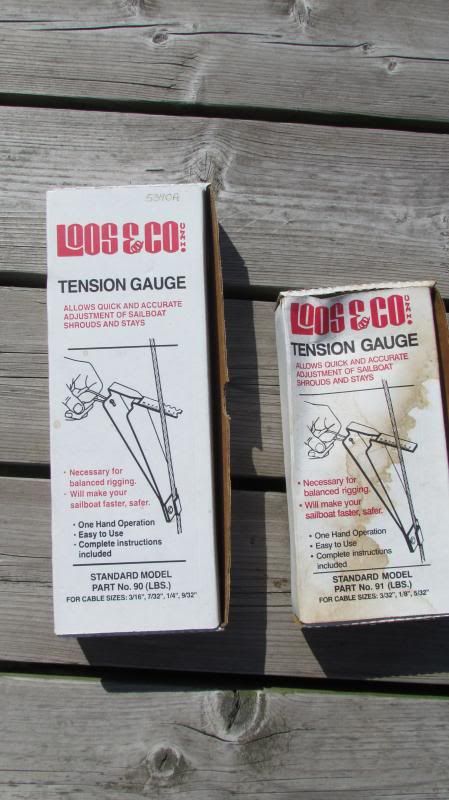"Welcome to a new kind of tension..."
-Green Day
A Friend of the Dock, Rod (Henceforth known as FOD Rod), is one of those boaters that we all know.
Or wish we knew.
Or hope to know.
He's owned sailboats and powerboats and been comfortable on each, has run big boats and small boats, been a yacht club member and a dock rat, and has not developed, (or maybe lost) any prejudices regarding size, mode of propulsion or affiliation. Over more than three decades, he's been there, done that... quietly. He doesn't steer a barstool and try to command a room, he'd rather be polishing, or fixing or sailing his Catalina or piloting his Limestone.
Along the way he's amassed some of the gear that we all wish we had, have thought about buying, or didn't even realize existed.
Like Loos Gauges.
One of the endlessly interesting (or numblingly, observing-paint-dryingly boring, depending) aspects of sailing is the myriad infinite adjustments that can be made to a sailboat's rig, and the effect that the rig tension has on performance. Some sailors like a loose rig, believing that it relieves strain on the mast step and compression post, others prefer a rig that is tight as a drum port-starboard, but with a lot of fore-aft adjustability, others like tight stays with loose shrouds, etc.,
Me? I've always tuned my rig by eye and by ear. Tighten up the backstay until the forestay is tight and the mast has a nice rake, then tighten the lower shrouds until they all give me the same note when twanged, then do the same thing with the upper shrouds.
(I like the upper shrouds to sound a half tone to a tone lower than the lower shrouds, but then, I like a lot of bass.)
It always seemed okay to me, but I wondered- am I, maybe, overtightening or undertightening my rig? should I be concerned about a catastrohic failure, or could I maybe find another 1/10th of a knot and less weather helm if I cranked the turnbuckles another turn or two?
FOD Rod mentioned that he, of course, had the tools for this, and kindly loaned me his Loos gauges.
The process is simple, and takes little time. The tools required are just as simple:
The gauge, and the tools you use to adjust your turnbuckles.
Testing tension is just plain stupid simple. Clip the gauge to the stay or shroud....
Pull the lanyard until the pointer reaches the black line....
... and note the number at the middle of the stay/shroud .
Included with the Loos Gauge is an instruction leaflet, which includes a conversion chart for optimum tension, based on the diameter of the wire. Compare your reading to the chart, then tighten or loosen the turnbuckles accordingly, rechecking until the tension is within spec. Easy peasy.
Turns out my tuning-by-twang was pretty close. The uppers benefitted from another couple of turns on the turnbuckle, the backstay took three, the lower shrouds were spot on.
I don't know whether it has made our galleon of a pocket cruiser any faster, but it's kinda cool to know that she is as optimized rig-wise, as she can get.
Give it a try.
"Talk The Dock!"





No comments:
Post a Comment